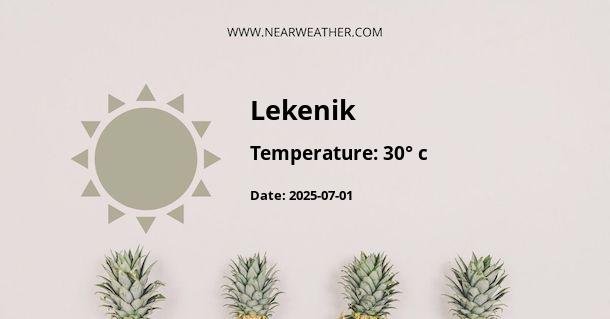Understanding the Climate and Weather Patterns of Lekenik, Croatia
The quaint municipality of Lekenik, nestled in the central part of Croatia, experiences a climate that is both continental and moderate. Understanding the nuanced weather patterns of Lekenik requires a broad look at its seasonal variations, temperature fluctuations, and precipitation levels, all of which play a role in the region's agricultural productivity and the local lifestyle.
Geographic and Topographic Influences on Lekenik’s Climate
Lekenik, set in the Sisak-Moslavina County, lies at an elevation that slightly influences its overall climate. While the geography of Croatia can lead to diverse weather conditions, Lekenik’s relatively flat terrain ensures a more consistent climate across the municipality.
Average Temperature and Precipitation
| Month | Average High (°C) | Average Low (°C) | Precipitation (mm) |
|---|---|---|---|
| January | 3 | -3 | 42 |
| February | 6 | -2 | 35 |
| March | 11 | 2 | 50 |
| April | 16 | 6 | 55 |
| May | 21 | 11 | 68 |
| June | 24 | 14 | 78 |
| July | 26 | 16 | 73 |
| August | 26 | 15 | 66 |
| September | 22 | 11 | 70 |
| October | 16 | 7 | 72 |
| November | 9 | 3 | 77 |
| December | 4 | -1 | 57 |
This table outlines a typical year in Lekenik, showcasing the average high and low temperatures alongside monthly precipitation. These figures are based on data accumulated over several years, indicating trends rather than precise predictions.
Seasonal Weather Conditions
The weather in Lekenik is quite typical of the Pannonian Basin, with four distinct seasons, each contributing to the region's charm and potential challenges for local inhabitants and businesses.
Winter
- Temperature: Winter in Lekenik can be brisk, with temperatures often hovering around freezing. Snow is common and can persist, leading to picturesque landscapes that are ideal for wintertime activities.
- Snowfall: On average, Lekenik experiences moderate snowfall, which can range from light dustings to significant storms, particularly from December through February.
- Considerations: The cold weather necessitates proper heating and insulation, along with preparations for potential snow removal and winter driving precautions.
Spring
- Temperature: As spring approaches, the snow melts, and the temperature begins a gradual increase, leading to a rebirth of local flora and a resumption of outdoor activities.
- Rainfall: Precipitation in spring can be variable, with rainfall increasing in both intensity and frequency, necessitating good water management to prevent flooding and support agriculture.
- Considerations: This period of transition can lead to unpredictable weather, with occasional late frosts or unseasonably warm spells affecting crop growth and biodiversity.
Summer
- Temperature: Summers in Lekenik are warm, and temperatures can rise significantly, often requiring measures to cope with the heat, particularly in urbanized areas that may experience the heat island effect.
- Thunderstorms: The warmer air can often lead to thunderstorms, some of which can be severe, with the potential for hail and strong winds. Proper preparedness is key to minimizing the impact of these summer storms.
- Considerations: Touristic activities should include precautions against heat stress, and agriculture may need to manage water use carefully during dry spells.
Fall
- Temperature: The autumn months see temperatures declining steadily, the leaves change color, and the harvest season begins for various crops that thrive in this temperate climate.
- Rainfall: Rainfall can be frequent during the fall, and as temperatures drop toward winter, early snowfalls can occur, particularly in late November.
- Considerations: Preparations for winter begin in earnest, with a focus on completing harvests and ensuring proper infrastructure maintenance against the cold season ahead.
Climate Change Impact on Lekenik’s Weather
Like many regions across the globe, Lekenik is not immune to the effects of climate change. Shifts in average temperatures, the frequency and intensity of extreme weather events, and alterations in precipitation patterns have all been noted in recent years. Locals and authorities alike must adapt to these changes with improvements in infrastructure, agriculture, and emergency response protocols.
Extreme Weather and Drought Management
Climate models predict alterations in extreme weather patterns—both droughts and floods could become more common. The municipality can leverage these forecasts to manage water resources more efficiently and provide measures to protect against soil erosion and degradation.
Conclusion
Understanding the climate and weather patterns of Lekenik, Croatia, is essential for multiple aspects of daily life, from farming and tourism to infrastructure and environmental conservation. By examining temperature averages, precipitation, and seasonal variances, we can predict and prepare for the challenges and opportunities that each season brings. As our climate continues to shift and evolve, this knowledge also becomes critical in our endeavor to adapt and to plan for the future of Lekenik and its inhabitants.
A - Lekenik's Latitude is 45.585560 & Longitude is 16.211390.
A - Weather in Lekenik is 6° today.
A - Climate Conditions in Lekenik shows overcast clouds today.
A - Humidity in Lekenik is 70% today.
A - Wind speed in Lekenik is 12.49 km/h, flowing at 36° wind direction. today.
